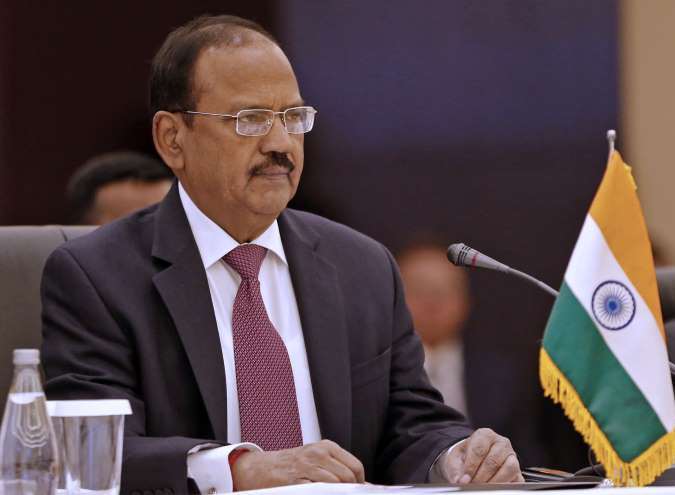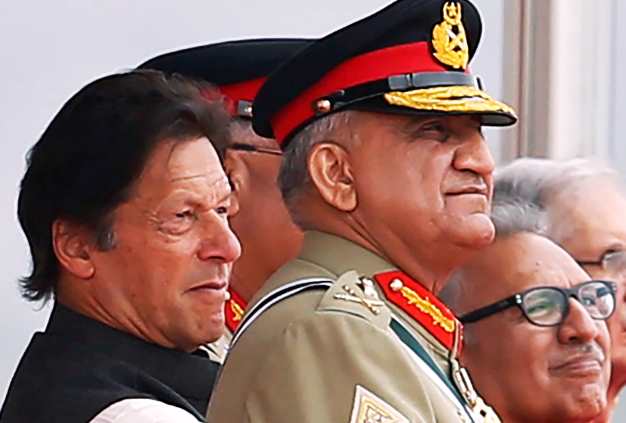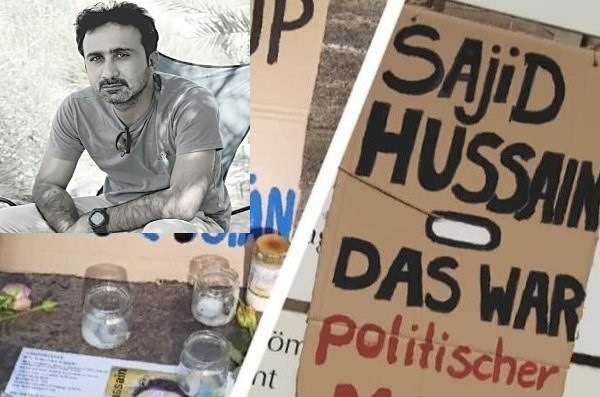Unable to arrange a face-to-face meeting with Crown Prince Muhammad Bin Suleiman of Saudi Arabia, the high-powered delegation led by Pakistan Army chief General Qamar Bajwa and ISI chief has returned empty-handed to Islamabad.
In addition to the humiliation caused by failing to gain an audience with the Crown Prince, the Saudi government also cancelled its decision to honour General Bajwa, a promise that was made by the Islamic Kingdom just a few months earlier.
The trip of the Pakistani generals to Saudi Arabia comes after Saudi Arabia cancelled a USD 3.2 billion oil credit facility to Pakistan. In 2018, when Imran Khan ‘won’ the general elections, Saudi Arabia gave Pakistan a loan of USD 3 billion to help the latter with its balanced of payments crisis and issued the above-mentioned oil credit facility to Pakistan.
Saudi Arabia’s decision to cancel the oil credit facility to its Muslim brother country came after Pakistani foreign minister Shah Mahmoud Qureshi issued a statement literally threatening the Saudi led Organisation of Islamic Cooperation (OIC) to convene an emergency special session on Kashmir or else he would call a meeting of like-minded Muslim ‘brother’ countries. This tantamount to splitting the Saudi led alliance.
The statement enraged the Saudis and in retaliation they cancelled the USD 3.2 billion oil credit facility and made a demand that Pakistan pays back USD 1 billion dollars that it already owes them. Pakistan had to beg China to lend her the money in order to pay Saudi Arabia. Since the abrogation of Article 370 of the Indian Constitution that gave the so-called special status to the former state of Jammu and Kashmir, Pakistan has suffered an anti-India diplomatic knockout. Pakistan has isolated herself and the country has only itself to blame.
Defence analyst Major (R) Gaurav Arya says that in today’s global economic environment only a pluralistic approach would work. And rightly so. UAE and Israel establishing diplomatic and trade relations brokered by Donald Trump’s administration is testimony to the reality of pluralism in a cutthroat competitive global market. Regrouping of nation-states into new economic zones and partnerships requires new thinking and bold leadership.
Unfortunately, Pakistan is still entrapped in the obsolete political narrative of the Ottoman period and has failed to produce or even adapt to new patterns of thought and give birth to bold leadership. Pakistan and its politics is rooted in envy, dishonesty and deception and has cost her the trust of the global community.
Today, Pakistan is known for its hate of Hindus, being envious of a fast-developing India, for its corrupt and dishonest handling of foreign aid and its trickery and deception in dodging the global community in the fight to eliminate Taliban and other variants of Islamic Jihadist organisations such as Lashkar-e-Tayyiba, Hizbul Mujahideen, Jaish-e-Mohammad or the recently covert terrorist outfit The Resistance Front which Major (R) Gaurav Arya calls “secularisation of terrorism”.
The news regarding the establishment of diplomatic relations between UAE and Israel coincided with another important development. 10,000 Central Armed Police Forces (CAPF) stationed in the Kashmir Valley have been directed by the Home Ministry to return to their bases in mainland India. This sends a strongmessage to the global community regarding the law and order improvement in the ill-fated region of the Kashmir Valley.
Since the abrogation of Article 370, peace has been re-established in the Valley at a more-than-expected fast pace. No bloodbath has taken place as previously predicted (read threatened) by Pakistani Prime Minister Imran Khan.
Scores of sleeping terrorist cells have been busted in Srinagar and many jihadi infiltrators, as well as home-grown individual terrorists, have been eliminated in deadly encounters in which our jawans have also laid down their lives. And even more interestingly, (but mostly unreported in Indian media), people of Gilgit-Baltistan (GB) and Pakistan-occupied Kashmir (PoK) have been holding protests against Pakistan almost every single day.
Daily protests are now the new norm in PoK. The political and social content of these protests range from demonstrations against long durations of load shedding in Palandri for instance, to demands for justice raised in Nakyal for Ejaz Abbasi, a senior PoK journalist who was beaten up at the Press Information Department (PID) in Islamabad a couple of weeks ago, to torch-bearing rallies in Muzafarabad against the diversion of Neelum-Jhelum River for Azad Patan and Kohala Hydropower Projects, both of which are part of the illegal CPEC agreement between Pakistan (read military) and China (read Communist Party-controlled corporations).
The CPEC is illegal because PoK is Indian territory occupied by Pakistan and the later cannot enter into any defence or economic agreement that include GB or PoK until and unless the territorial dispute between Pakistan and India is resolved and Pakistan withdraws its army from GB and PoK.
Similarly, in Pakistani-occupied GB, people are protesting against cuts in wheat subsidies, illegal land grab of green pastures in Nilter, land grab for a bus stand in Gilgit as well as for the illegal extension of Gilgit airport, lack of medical facilities in Hunza, Load shedding in Skardu, and so on and so forth.
The USD 14 billion Diamer-Bhasha Dam Hydroelectric project is another issue that has generated anxiety among the subjugated population of GB. The displaced people of the villages in and around the historic city of Chillas are awaiting the deceitful promise made by the Pakistan and Chinese companies to resettle them and pay compensation for loss of their ancestral home.
For every 25 people in GB, there is one Pakistani army personnel deployed. Only last month, Imran Khan approved of an additional 100 army platoons to be sent to Diamer district to protect the construction site of the dam.
Pakistan’s high handedness and arrogance is manifest in the fact that she does not even bother to consult the real stakeholders of CPEC or so-called developmental project that are being initiated in the occupied territory of GB or PoK. Therefore, in the coming weeks and months, conflict between PoK/GB and Pakistani establishment seems inevitable. This became evident when on August 5 this year Imran Khan went to address the puppet legislative assembly in PoK.
During his speech, a rebellious PoK Prime Minister Farooq Haider, demanded that Imran Khan and Pakistan grant PoK self-determination! He said, “The world will not listen to you (Pakistan), however, if we (PoK) were free and had autonomy then they themselves would take their case to the global community!” This came as a shock to the Pakistani establishment.
Likewise, the outgoing chief minister of GB Hafiz Hafeez Ur Rehman, has been complaining about Pakistan’s high handedness in dealing with pressing issues related to GB. Hence, Pakistan has lost the goodwill and the trust of its ‘Muslim’ brothers living under occupation in GB and PoK and they now seem desperate to find a solution to end their misery.
On the other hand, Pakistan is faced with an insurgency in Balochistan that is now turning into a civil war between the oppressed Baloch people and the barbaric Pakistani army. Similar, with the resurfacing of independence movement in Sindh reignited by peasant-based Sindhudesh Revolutionary Army; a previously non-violent nationalist, anti-feudal, anti-Pakistan sentiment is now gradually turning into an armed insurgency.
While this movement has managed to catch the imagination of the youth, more importantly, it has been able to attract the Sindhi urban lower-middle and working-class since urban-based Muttahida Qaumi Movement (MQM) announced that it would join the struggle to free Sindh from Pakistani occupation.
In Khyber Pakhtunkhawa, Pashtun Tahafuz Movement (PTM) is becoming a focal for crusade against the atrocities of Pakistan military in the tribal areas. In Punjab, a witch-hunt against those who oppose domination of civil society by military and Islamic clergy is currently underway. Sackings of Professors Pervez Hoodbhoy and Ammar Ali Jaan of Quid-e-Azam University in Islamabad and FC College in Lahore respectively are fresh examples of state-sponsored repression in Punjab.
The new Tahafuz e Bunyaad e Islam (Protection of Fundamentals of Islam) bill passed by the Punjab assembly last month is seen as part of establishments’ attempts to impose censorship on print and spoken word. 100 books were banned immediately after the bill became an Act. More than 1,000 books are being scrutinised by the state to check if they meet the Wahhabi narrative of Islam. Hence cultural and intellectual genocide has begum in Punjab. Student and workers’ protesting and striking for better pay and health and safety facilities are now holding joint protest rallies in Lahore.
The recent visit to Saudi Arabia by Pakistan Army chief General Bajwa and DG ISI that ended up in humiliation will add to the feeling of alienation and haplessness among the common people in Punjab and PoK in particular and Pakistan in general. The failure of Imran Khan to provide 50 lakh houses and 10 million jobs, a GDP showing negative growth of minus 0.38 per cent and the persecution of political opponents are all perfect ingredients of a recipe for rebellion.
However, it is the recent visit of the Pakistan Army chief and DG ISI along with other top brass military officials and Pakistan’s perpetual failure in harnessing diplomatic support that could prove to be the last bale carrying the straw that will sink the ship.
The aftermath of the downward diplomatic spiral and the impending rebellion of Pakistani society can be summed up in Major (R) Gaurav Arya’s own words “an implosion of the synthetically manufactured country called Pakistan is neigh.”
The author who is a human rights activist from Mirpur in PoK. He currently lives in exile in the UK. (ANI)



